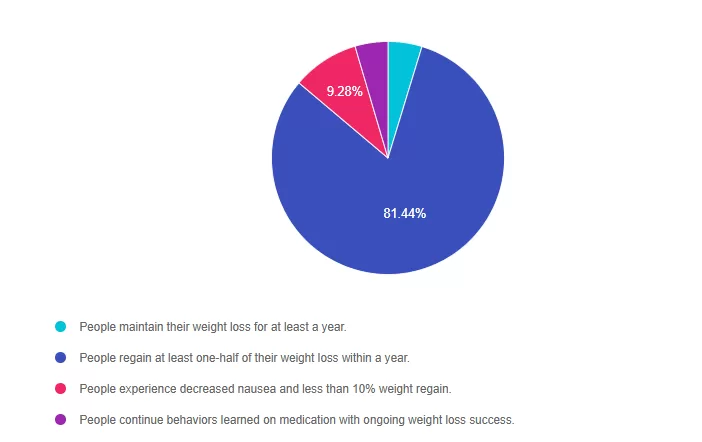For last week’s practice question, we quizzed participants on what happens when people stop taking GLP /GIPs. 81% of respondents chose the best answer. We want to clarify and share this important information, so you can pass it on to people living with diabetes and your colleagues, plus prepare for exam success!
Before we start though, if you don’t want any spoilers and haven’t tried the question yet, you can answer it below: Answer Question

Question:
About 30% of people with diabetes started on GLP-1’s stop taking this medication before completing a year of therapy.
According to ADA Standards, what results from sudden discontinuation of GLP-1s /GIP like semaglutide and tirzepatide?
Answer Choices:
- People maintain their weight loss for at least a year.
- People regain at least one-half of their weight loss within a year.
- People experience decreased nausea and less than 10% weight regain.
- People continue behaviors learned on medication with ongoing weight loss success.

Getting to the Best Answer
Answer 1 is incorrect. 4.71% chose this answer. “People maintain their weight loss for at least a year.” According to the ADA Standards, people regain 50 to 70% of the weight lost after this gut hormone replacement therapy is stopped.
Answer 2 is correct. 81.44% of you chose this answer. “People regain at least one-half of their weight loss within a year.” YES, this is the best answer! Great JOB. According to ADA Standards, “sudden discontinuation of semaglutide and tirzepatide results in regain of one-half to two-thirds of the weight loss within 1 year. Consider trying lowest effective dose, using intermittent therapy, or stopping medication followed by close weight monitoring. This information is helpful for our clinical practice as we navigate the best approach to utilizing GLP-1 /GIP Therapy.
Answer 3 is incorrect. About 9.28% of respondents chose this. “People experience decreased nausea and less than 10% weight regain.” According to the ADA Standards, people regain 50 to 70% of the weight lost after this gut hormone replacement therapy is stopped.
Finally, Answer 4 is incorrect. 4.57% chose this answer. “People continue behaviors learned on medication with ongoing weight loss success.” According to the ADA Standards, people regain 50 to 70% of the weight lost after this gut hormone replacement therapy is stopped.
We hope you appreciate this week’s rationale! Thank you so much for taking the time to answer our Question of the Week and participate in this fun learning activity!
Ignite your passion & prepare for Diabetes Certification!
Join our Expert Team at our dynamic Virtual DiabetesEd Training Conference April 16-18th, 2025

Gain fresh insights, practical tools, and a deeper understanding of the latest in person-centered diabetes care. Our expert team brings the ADA Standards of Care to life—covering medications, behavior change, technology, and more! If you’re preparing for the CDCES or BC-ADM exam, this conference—paired with free bonus courses—serves as the ideal study companion!
With interactive co-teaching, we keep sessions engaging, relevant, and fun. Let’s learn and grow together!

Our expert team transforms complex diabetes science into clear, practical insights—keeping it real, engaging, and fun! The faculty includes:
- Diana Isaacs, PharmD, BCPS, BC-ADM, BCACP, CDCES
- Coach Beverly Thomassian, RN, MPH, CDCES, BC-ADM
- Christine Craig, MS, RD, CDCES
- 3 Days: of critical information delivered by passionate speakers in an engaging and fun format!
- 11 Bonus Online Courses: As a course attendee, you automatically receive a bonus online course bundle of 11 online courses valued at over









